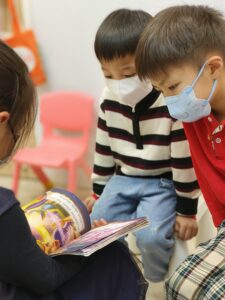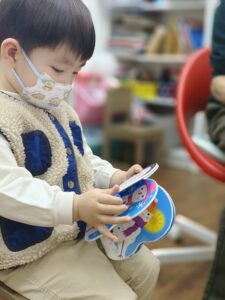At Book Talk, we believe storytelling plays an important role in your child’s overall development. Whether it is as simple as talking about your childhood or sharing a funny story about your day, storytelling offers several advantages to children.
Take a look at this list and learn about the benefits of storytelling for children.
Instills virtues in your little one

Young kids love listening to stories. When you invest adequate time for doing storytelling with them, you are instilling virtues they can carry with them as they grow old. Tell them stories with characters whose values they can emulate or stories with meaningful messages. Taking time to do this inculcates valuable lessons in children and helps them learn about kindness, wisdom, honesty, compassion and more.

Storytelling is an excellent way to boost your child’s listening skills.
It isn’t always easy to hold a child’s attention for long. Many kids find it hard to concentrate on something for an extended period of time. They either butt in and do more of the talking or their minds end up wandering somewhere else. However, doing storytelling with your child can help improve their listening skills. They will become more attentive and learn how to increase their focus on a certain topic.
Children who are exposed to storytelling at an early age tend to be better listeners than those who aren’t exposed until later years. This is because they have been able to develop better concentration skills, which can help them stay focused on what others are saying even if there are other distractions around them such as TV shows playing in the background or something else that catches their eye like an interesting toy sitting across from them on a shelf next door!

Storytelling is a great way to increase imagination skills for children.
The world is a magical place. Children are natural storytellers, but they need to be taught how to harness their creativity and use it as a tool.
Storytelling is the best way to do this. It allows them to engage with a narrative and imagine themselves in the story, allowing them to practice using their imagination in ways that are fun and educational, while also teaching them about language and how stories work.
As children grow up, they will naturally lose some of their ability for imaginative play—but if you encourage your child’s talent for storytelling, you can help them retain it throughout their life.

Storytelling improves communications skill for children
Storytelling is a fun and effective way to help your child develop their communication skills. When reading or telling stories to your little one, you can encourage them to express their thoughts and feelings. You can also have them ask questions or discuss their ideas when you’re doing a storytelling activity with them. As they continue to indulge in storytelling activities with you, they will learn more words and grow more comfortable expressing themselves.

Storytelling is an excellent way to sharpen your child’s memory.
When you read them a story, you can do a review or ask them to recall some of the details. Ask them questions and see how much information they have retained.
This is great practice for when they are in school and need to remember facts for a test or presentation.
When you’re telling them stories, try asking your child what happens next in the story after you’ve read it aloud. This will help them learn how to sequence events in time so they can better understand what they are reading or hearing. It also helps them build their vocabulary!

Storytelling can improve social skills in children.
Storytelling can teach young kids so many things about the world and life. It gives them plenty of opportunities to learn wonderful ideas and things they have never encountered before. Given these benefits, parents have all the reasons to spend adequate time telling stories with their kids.
Through storytelling, children learn how to pay attention and listen actively to the person talking. They learn to be more patient as they listen to others speak. It also opens their eyes to other people’s thoughts and understanding how each and every person’s opinion vary.
